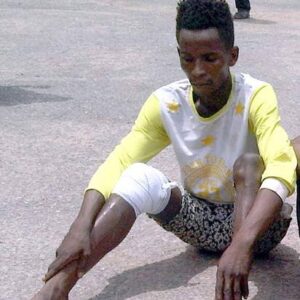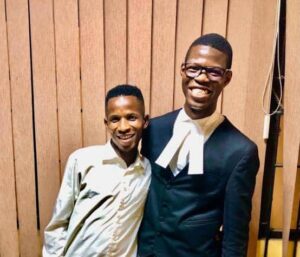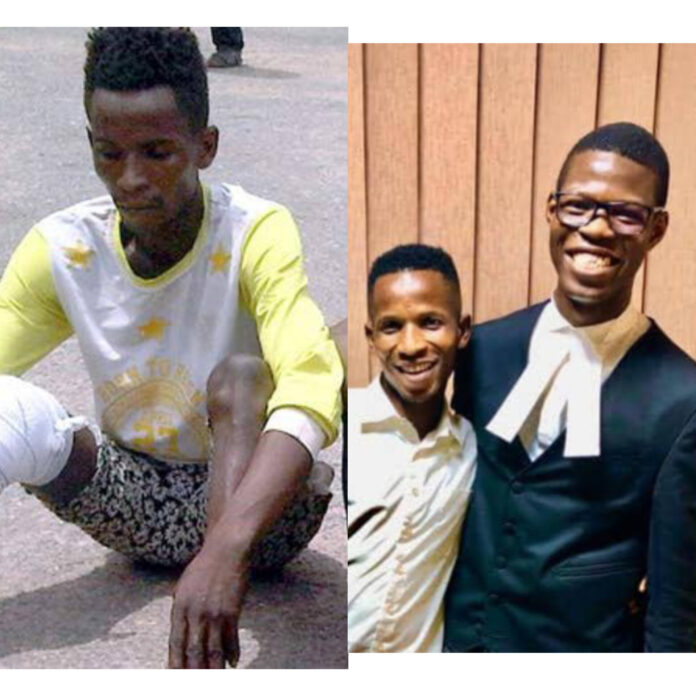By Oyeyemi Abolade
Lagos, Nigeria — For Adeniran Adetunji, a former club DJ, nothing could have prepared him for the horrors that followed the night of June 2015.
At just 27 years old, newly married and expecting his first child, he was performing at a club when officers from the now-disbanded Special Anti-Robbery Squad (SARS) stormed in and arrested him.
Eight years in prison followed without trial, evidence, or justice.

“Death is easier to deal with than being remanded in a Nigerian prison,” Adeniran said. “Prison doesn’t just haunt you, it ruins you.”
Adeniran was accused of being part of a kidnapping ring based on the word of a casual acquaintance. There was no investigation and no opportunity to defend himself. He was tortured, shot in the leg, and dragged into what SARS officers called a “torture room,” where his knees were broken with metal, and he was coerced into false confessions.
“They told me to fight with a monkey while I was handcuffed. They slapped me so many times I nearly went deaf,” he recalled.
He woke up in a poorly equipped prison hospital and was later transferred to a Lagos maximum-security facility again, without formal charges or a court appearance. There, he remained for the next eight years.
Personal Loss, Systemic Rot
While Adeniran languished behind bars, his pregnant wife gave birth alone. Overwhelmed by his prolonged absence and the high cost of legal follow-up, she eventually left him.
Today, he has only seen his son, now nine years, once since his release in 2023. The boy did not recognize him.
“I left the club that night as a free man. By morning, I was an inmate,” he said.
The conditions he describes are appalling: overcrowded cells, poisonous food, and rampant violence. He alleges that some inmates without family ties were killed, and their body parts were sold.
“I met people who weren’t criminals when they came in, but the system turned them into something else. That’s how monsters are created.”
Legal support was nonexistent. Burdened by mounting bribe demands and legal delays, his family eventually gave up. Every inquiry about his case file ended with the same response: “It’s missing.”
A Chance Encounter with Justice
A glimmer of hope came in 2020, during a prison outreach visit by Headfort Foundation, a youth-led nonprofit organization providing free legal services to detainees. Adeniran met the group’s founder, Oluyemi Orija, and pleaded for help.
“I told her, ‘Mummy, please help me. Don’t let me die here for something I know nothing about.”
Headfort took up his case in partnership with lawyer Ayanjogbe, who had tried to assist him years earlier. Yet even when COVID-19 amnesties were granted, Adeniran remained in custody — his case file still untraceable.
It wasn’t until 2023, after nearly four years of persistent legal advocacy, that he was finally released.
“When they told me I was going home, I cried. Not because I was happy, but because I didn’t believe freedom was real anymore.”
Adeniran walked out with nothing. His seized belongings, phone, car key, and ATM card, were never returned.

Today, he works as a hospital driver in Epe, trying to rebuild his life and, one day, return to music and media.
“I’m healing. I’ve forgiven, even though it still hurts. Nigeria took eight years of my life on a baseless accusation.”
The Bigger Picture
Adeniran’s story is not unique.
According to data from the Nigerian Correctional Service, over 66% of the country’s 80,000 inmates are awaiting trial, roughly 53,000 people. Prisons operate at 136.7% capacity, and thousands are held indefinitely due to lost case files, missing legal representation, or systemic neglect.
Since its founding in 2019, Headfort Foundation has secured the release of 917 wrongfully detained individuals. Many, like Adeniran, were accused of minor or non-violent offences and held without trial.
One such case is Nyeche Uche, a 60-year-old man who spent 14 years in pre-trial detention before his file was finally found and released in 2023. Another is Ayomide, a young man detained for nearly a year without legal representation, freed after Headfort’s intervention.
“We’re not just fighting individual cases,” said Headfort project manager Oluwakemi Adenekan. “We’re fighting a broken system. And journalists have a key role in telling these stories.”
A System That Breeds Injustice
Human rights groups have long argued that Nigeria’s justice system disproportionately targets poor, vulnerable youth, especially in urban areas. Many detainees are unaware of their rights, and few know that legal aid is available.
The Administration of Criminal Justice Act (ACJA), introduced in 2015 to ensure the speedy dispensation of justice, holds promise for reform, but whether it can truly deliver change in a system this broken remains to be seen. Only time will tell.
Adeniran’s account adds to growing calls for sweeping justice sector reform, particularly in Police accountability, Access to legal representation, Case management, digital record-keeping and Transparency in pre-trial detentions.
“If I’m ever arrested again in this country, God forbid, I’d rather die on the spot,” Adeniran said.
For now, he is trying to move forward.
“With time, I believe things will fall into place,” he said. “But the trauma stays with you. Every time I remember how Nigeria wasted my youth, I feel the pain all over again.”




